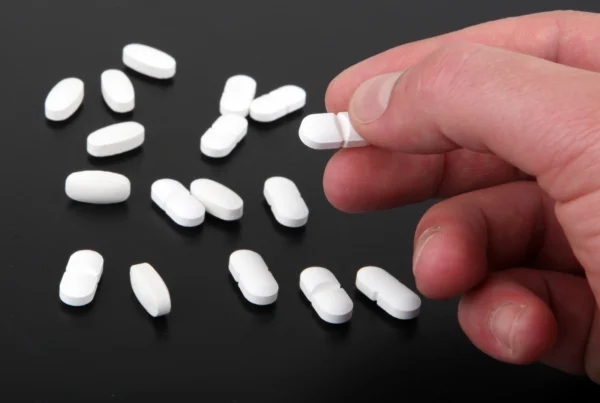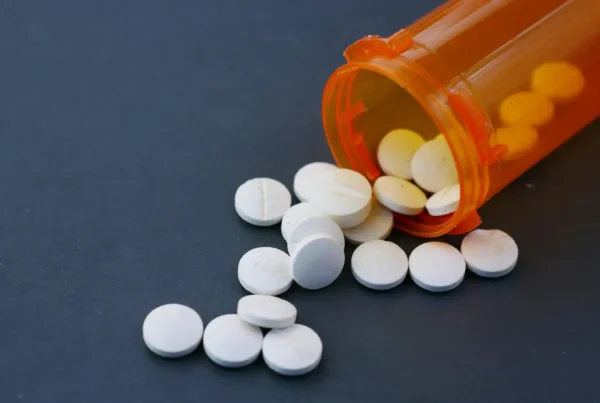
Table of Contents
Key Points
- Drug-induced psychosis results from either ingesting too much of a drug or stopping it suddenly and experiencing withdrawal from that drug. Symptoms can include paranoia, hallucinations, and delusions.
- Drug-induced psychosis rarely turns into schizophrenia. Drug-induced psychosis is an acute condition that typically goes away with treatment.
- If you or someone is experiencing a drug-induced psychotic episode, get to a safe place and call 911. Referral to a treatment center can occur after the person is stable.
Drug-induced psychosis (DIP) is a psychiatric condition in which a person experiences a separation from reality due to significant and prolonged drug intake. This can include symptoms such as hallucinations (seeing, hearing, or feeling things that are not there).
It may also include symptoms like delusions (believing that someone is inherently superior with no evidence) or paranoia (believing terrible things with no evidence). People who take drugs for significant periods are at greater risk for DIP.
Facts About Drug-Induced Psychosis
Drug-induced psychosis is a type of psychosis that occurs either from the use or cessation of the use of a drug or drugs. Research from the National Institutes of Health (NIH) has found that users who experience severe dependence on a drug they were ingesting have higher rates of psychosis.[1]
Of all the drugs tested during the research, cannabis (marijuana) had the highest prevalence of DIP, beginning at over 12 percent of users.[2] This includes comparisons with cocaine, methamphetamine, MDMA, and opiates that were tested in the research.
The research has also suggested that dopamine-inhibiting drugs such as cannabis and cocaine may be more likely to lead to psychosis than dopamine-releasing drugs such as methamphetamines. The study also found that younger people who are unemployed are more likely to experience psychotic episodes when they ingest drugs.
Some users of drugs may also experience psychosis when they stop ingesting drugs or while experiencing withdrawal.[3] Other people who use drugs are more likely to experience psychosis, to begin with, because of a co-morbidity such as schizophrenia, which is an inherited mental illness.
While the relationship between drug use and psychosis is still being studied, the currently available research indicates that the more drugs one ingests over time and the deeper the dependency on those drugs, the greater the possibility that drug-induced psychosis can occur.
Symptoms of Drug-Induced Psychosis
Psychosis is a condition that distorts reality, often causing distressing experiences like hallucinations or delusions. There are commonly considered to be 5 stages of psychosis. The stage most commonly associated with a drug-induced psychosis falls under the acute or crisis stage.
Symptoms of drug-induced psychosis (DIP) can vary from person to person, depending on the drug they are ingesting and for how long. But generally, the symptoms of psychosis may include the following[4]:
- Confusion
- Paranoia (believing terrible things are happening or about to happen with no proof)
- Delusions (believing they are exceptional or superior to others)
- Visual, auditory, or olfactory hallucinations (seeing, hearing, or smelling things that no one else can see, hear, or smell)
- Antisocial behavior (not caring about what others think or feel)
People experiencing psychosis may distrust the world around them and adhere to a world only the person experiencing psychosis can see or experience.
Substances That Can Lead To Drug-Induced Psychosis
There are a number of drugs that can cause drug-induced psychosis. Even a legal drug like alcohol can induce psychosis when it becomes addictive. Some drugs are more at risk for drug-induced psychosis than others. But drug-induced psychosis relies on a number of factors, as the relationship between neurotransmitters, genetics, and human behavior is still being explored.
Psychedelics or Hallucinogens
While LSD (lysergic acid diethylamide) is the most “mind-altering” drug–people take it to induce hallucinations–it is one of the least psychosis-inducing drugs, according to research by the NIH. This may be because LSD works on the systems of neurotransmitters responsible for antipsychotics[5]–the drugs that are supposed to bring you back to reality.
Alcohol
In extreme cases, those who are addicted to alcohol can experience a form of psychosis called delirium tremens, colloquially known as “the DTs.” According to the NIH, most cases occur within 48 hours after ceasing drinking, and death can occur in 37% of cases without proper treatment.[6]
Alcohol works on the nervous system by interacting with GABA receptors, which can work to reduce neuronal excitability. Once alcohol consumption stops, the GABA receptors are no longer inhibited, and overactivity of the central nervous system begins, explaining the tremors.[7]
Delirium tremens is a common symptom related to long-term alcohol use and withdrawal. Symptoms of delirium tremens include profound confusion, tremors, tachycardia (fast heart rate), and agitation.[8]
Stimulants
Stimulants like methamphetamines can induce psychosis, but not across all three traditional components of psychosis (positive, negative, and cognitive). According to research conducted by NIH, when rats were given large amounts of amphetamines, they showed heightened sensitivity to the drug but retained enough working memory to complete a maze successfully.[9]
The researchers concluded that while some symptoms of psychosis were present and there is a direct link between psychosis and methamphetamines, the psychosis in rats was not present across all three pillars of psychosis.
Prescription Medications
Prescription medications like ketamine can induce psychosis when taken in one dose and not habitually.[10] Animals and humans experience psychosis from ketamine by showing symptoms of hyperlocomotion (moving too much). This particular kind of psychosis occurs because ketamine binds very closely to the dopamine receptor in the brain. This results in a surge of dopamine, creating a psychosis that is similar but not exact to the psychosis experienced on amphetamines.
Drug-Induced Psychosis Timeline
Drug-induced psychosis is different from other forms of psychosis in that it is sudden, seemingly comes out of nowhere, and lasts for anywhere between 30 minutes and 24 hours. If the person suspected of drug-induced psychosis is exhibiting symptoms such as paranoia, terror, hallucinations, and antisocial behavior and has stopped ingesting drugs within the last 48 hours, they are likely experiencing drug-induced psychosis.
Can Drug-Induced Psychosis Become Schizophrenia?
Rarely. Schizophrenia is a hereditary mental illness that never goes away–it is chronic. Drug-based psychosis is almost always temporary: symptoms can last from 30 minutes to 24 hours. While scientists are still learning about the complex nature of drugs and their impact on mental health, the short answer is that drug-induced psychosis rarely turns into schizophrenia later on. Drug-induced psychosis CAN trigger schizophrenia in people who are genetically vulnerable to psychotic disorders, but the incidence is low.
How Is Drug-Induced Psychosis Diagnosed?
Drug-induced psychosis can only be diagnosed by a practicing psychiatrist. The diagnostic criteria are available in the Statistical Manual of Mental Disorders, Fifth Edition (DSM-5). They include delusions and hallucinations that developed within a month of substance intoxication or withdrawal.[11]
Treatment For Substance Abuse and Drug-Induced Psychosis
Ocean Recovery offers treatment for substance abuse and mental health disorders, both on an inpatient and outpatient basis, in Southern California. Treatment for trauma, mental illnesses, and addiction are available in a relaxed environment that prioritizes holistic, evidence-based treatment.
Programs include twelve-step recovery, eye-movement desensitization and reprocessing (EDMR), and group therapy. Inpatient programs include outdoor activities such as paddle surfing, yoga, and beach walks to provide treatment for all aspects of the recovery experience: body, mind, and soul.
Don’t Ignore The Signs. Get Help For Drug-Induced Psychosis.
If you or someone you know is experiencing drug-induced psychosis, you are not alone. Help is available. Don’t ignore the warning signs or wish that things will get better on their own. Be proactive, and know that hope is only a phone call away.
Frequently Asked Questions About Drug-Induced Psychosis
OCEAN RECOVERY EDITORIAL GUIDELINES
The internet contains a vast amount of misinformation, but when it comes to your health only peer reviewed, research centered data matters. At Ocean Recovery, all content published throughout our website has been rigorously medically reviewed by a doctorate level clinician, and cross checked for medical accuracy. Our editorial process helps our readers trust that the information they are consuming is factual and based upon scientific data. Your health is our top priority, find out more about how we safeguard the integrity of information on our website. Read More About Our Process





